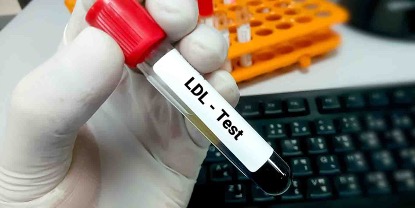Lipoprotein Blood Test Detects Hereditary Cardiovascular Risk
May 28, 2024
Source: drugdu
 445
445
 Lipoprotein (a), or Lp(a), is increasingly recognized as a critical but under-acknowledged potential risk factor for cardiovascular diseases, which are a significant public health concern. Around 20% of the global population has high levels of Lp(a), which heightens their risk of conditions such as myocardial infarction and stroke. Elevated Lp(a) levels contribute to the accumulation of lipids within artery walls, facilitating plaque formation and heightening the risk of cardiovascular events. While factors such as menopause, and kidney or liver diseases, as well as hyperthyroidism can affect Lp(a) levels, over 90% of the variability in Lp(a) levels is due to genetic differences in the lipoprotein (a) (LPA) gene. Consequently, testing for Lp(a) is a crucial diagnostic tool that helps clinicians accurately evaluate cardiovascular risk, and its integration into routine diagnostics is anticipated soon.
Lipoprotein (a), or Lp(a), is increasingly recognized as a critical but under-acknowledged potential risk factor for cardiovascular diseases, which are a significant public health concern. Around 20% of the global population has high levels of Lp(a), which heightens their risk of conditions such as myocardial infarction and stroke. Elevated Lp(a) levels contribute to the accumulation of lipids within artery walls, facilitating plaque formation and heightening the risk of cardiovascular events. While factors such as menopause, and kidney or liver diseases, as well as hyperthyroidism can affect Lp(a) levels, over 90% of the variability in Lp(a) levels is due to genetic differences in the lipoprotein (a) (LPA) gene. Consequently, testing for Lp(a) is a crucial diagnostic tool that helps clinicians accurately evaluate cardiovascular risk, and its integration into routine diagnostics is anticipated soon.
Roche’s (Basel, Switzerland) Tina-quant lipoprotein Lp(a) RxDx assay has received Breakthrough Device Designation from the U.S. Food and Drug Administration (FDA) for use in identifying patients with elevated Lp(a) and a history of atherosclerotic disease for treatment with an innovative Lp(a)-lowering therapy. Developed in collaboration with Amgen (Thousand Oaks, CA, USA), the Tina-quant Lp(a) RxDx assay is performed via a routine blood draw that uses a small blood sample for analysis. Global medical bodies recommend that every adult should have their Lp(a) levels tested at least once. However, Lp(a) does not have a consistent molecular weight. Consequently, the scientific consensus is that Lp(a) should ideally be measured in nmol/L, rather than the more common mg/L.
This approach differs significantly from the prevalent method of measuring Lp(a)'s molecular weight in mg/L. The Tina-quant Lp(a) RxDx assay quantifies Lp(a) molecules per liter of blood, setting the stage for Lp(a) to be used as a practical biomarker going forward. Once authorized, the new Tina-quant test will be available on select cobas platforms, aiding in the selection of patients who could benefit from Lp(a)-lowering medications. Currently, no FDA-authorized Lp(a) assay that measures in nmol/L is available in the U.S. This test will join Roche’s broader array of cardiovascular disease diagnostics, empowering healthcare professionals to make well-informed decisions and enabling patients to access pioneering treatments.
“While modern lifestyles are a major driver, as much as 30% of mortality associated with cardiovascular disease occurs in individuals without modifiable risk factors,” said Matt Sause, CEO of Roche Diagnostics. “Lp(a) is a critical marker for people at risk of cardiovascular disease, but medicine has had limited solutions to adequately address the problem. Through our collaboration with Amgen, Roche is paving the way to make elevated Lp(a) an actionable biomarker.”
"Lp(a) testing rates are markedly low, and existing lab tests may not consistently and accurately measure Lp(a) levels," said Jay Bradner, M.D., executive vice president of Research and Development and chief scientific officer at Amgen. "By combining Amgen’s deep legacy and expertise in cardiovascular disease with Roche’s diagnostic expertise, we can accelerate access to more standardized testing and equip more patients and healthcare providers with important information to better understand their risk for cardiovascular disease."
Source:
https://www.labmedica.com/molecular-diagnostics/articles/294801284/lipoprotein-blood-test-detects-hereditary-cardiovascular-risk.html
Read more on
- Gusekirumab Injection Accepted by CDE, Multiple Pipelines Advancing Simultaneously March 4, 2026
- Yifan Pharmaceutical’s teriparatide injection has been accepted by the CDE (Center for Drug Evaluation), adding a new domestic player to the osteoporosis treatment field March 4, 2026
- //news.yaozh.com/archive/47318.html PD-1 sales surge March 4, 2026
- A major breakthrough! Roche’s oral BTK inhibitor achieves its third Phase III clinical trial victory, a game-changer in the multi-billion dollar MS (manufactured pharmaceuticals) market. March 4, 2026
- GB19 Injection Approved for Clinical Trials of Cutaneous Lupus Erythematosus March 4, 2026
your submission has already been received.
OK
Subscribe
Please enter a valid Email address!
Submit
The most relevant industry news & insight will be sent to you every two weeks.



